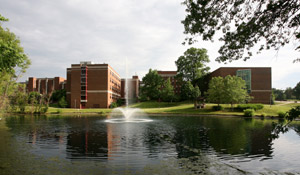Document Type
Article
Abstract
Peroxins are genetically defined as proteins necessary for peroxisome biogenesis. By screening for reduced response to indole-3-butyric acid, which is metabolized to active auxin in peroxisomes, we isolated an Arabidopsis thaliana peroxin4 (pex4) mutant. This mutant displays sucrose-dependent seedling development and reduced lateral root production, characteristics of plant peroxisome malfunction. We used yeast two-hybrid analysis to determine that PEX4, an apparent ubiquitinconjugating enzyme, interacts with a previously unidentified Arabidopsis protein, PEX22. A pex4 pex22 double mutant enhanced pex4 defects, confirming that PEX22 is a peroxin. Expression of both Arabidopsis genes together complemented yeast pex4 or pex22 mutant defects, whereas expression of either gene individually failed to rescue the corresponding yeast mutant. Therefore, it is likely that the Arabidopsis proteins can function similarly to the yeast PEX4–PEX22 complex, with PEX4 ubiquitinating substrates and PEX22 tethering PEX4 to the peroxisome. However, the severe sucrose dependence of the pex4 pex22 mutant is not accompanied by correspondingly strong defects in peroxisomal matrix protein import, suggesting that this peroxin pair may have novel plant targets in addition to those important in fungi. Isocitrate lyase is stabilized in pex4 pex22, indicating that PEX4 and PEX22 may be important during the remodeling of peroxisome matrix contents as glyoxysomes transition to leaf peroxisomes.
Publication Date
December 2005
Publication Title
The Plant Cell
Volume
17
Issue
12
First Page
3422
Last Page
3435
DOI
10.1105/tpc.105.035691
Recommended Citation
Zolman, Bethany; Monroe-Augustus, Melanie; Silva, Illeana; and Bartel, Bonnie, "[Accepted Article Manuscript Version (Postprint)] Identification and Functional Characterization of Arabidopsis PEROXIN4 and the Interacting Protein PEROXIN22" (2005). Biology Department Faculty Works. 140.
DOI: https://doi.org/10.1105/tpc.105.035691
Available at:
https://irl.umsl.edu/biology-faculty/140



Comments
© American Society of Plant Biologists.